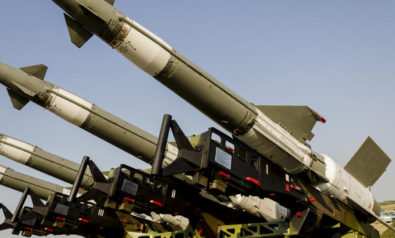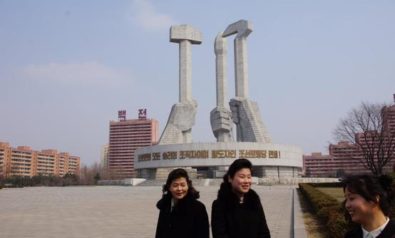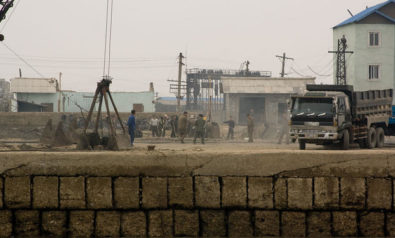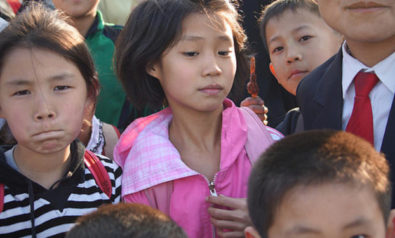North Korea’s recent rhetoric is neither new nor surprising. While nuclear weapons in the hands of a volatile and irrational leader are cause for concern, it is unlikely that Pyongyang is on a suicide mission.
The ongoing tensions between North Korea, South Korea and the United States have once again highlighted the vulnerability of the Korean Peninsula, a region often plagued by the possibility of war. The threat this time is from the untested 29-year-old Kim Jong-un, the Supreme Leader of North Korea and grandson of the country’s founder, Kim Il-sung. The supreme leader has threatened to turn Seoul, the capital of South Korea, into a “sea of fire”, with American military bases in the Asia-Pacific littoral also on his hit list.
While this bellicose rhetoric is not new to North Korea, there are some differences this time around. The international community has little or no experience in dealing with Kim Jong-un, and there is new evidence that the country is now a more capable nuclear weapons state, having tested nuclear missiles in December 2012 and February 2013. The threat of nuclear war, which Kim Jong-un has vociferously hinted at over the past few weeks, has forced the UN and the international community to take a tough stand on the issue, one that has only further angered the regime. In response to Pyongyang’s nuclear test earlier this year, the UN Security Council passed two resolutions strengthening existing sanctions on the country.
Despite Pyongyang’s threats of a nuclear strike, the US, South Korea and much of the global community are viewing the present situation with a degree of disbelief, as any act of nuclear warfare would be suicidal for North Korea. The communist regime has had a history of confrontation with the outside world over its nuclear programme, having threatened to engage South Korea and the US in war on a number of occasions in the past. Its survival, thus far, in an environment that it views as increasingly hostile, has been pronged on its ability to play one foreign power against another – a task mastered during the Cold War when North Korea played China against the Soviet Union, ensuring assistance from both.
Juche – An Ideological Basis for Belligerence?
Pyongyang’s strategic policy is hinged on Juche, an ideology that espouses unconditional independence, self-reliance and survival. Propounded by Kim Il-sung, the country’s founding father, one of the key tenets of Juche is defence and self-reliance; violence is thus a justifiable means to defend national independence. This autarchic state ideology and its fundamentally isolationist approach is what differentiates North Korea from the rest of the world. The idea of state supremacy independent of external aid, association or intervention, with no scope of diplomacy and co-operation with the international community, has driven a continued rhetoric of aggression against perceived threats.
Juche goes a long way in explaining why North Korea is plagued by socio-economic crises — the country is regularly blighted by famines, it faces an obscene shortage of electricity and other basic facilities. Its grossly underdeveloped economy is a result of being cut off from the outside world, and has resulted in an imposition of extensive sanctions. It is thus Pyongyang’s impetuous response to rely on its nuclear weapons arsenal as a guarantor for its survival. Kim Jong-un has, in the midst of the ongoing hostility, reasserted the regime’s belief that nuclear weapons are the only assurance to survival. In a speech delivered at the central committee meeting of the ruling Workers Party of Korea earlier this month, the young leader focused on how nuclear capability supported development and security, and was a guarantor of peace, echoing a popular doctrine in security studies.
The global community has attempted to balance its relationship with North Korea over recent years. Pyongyang’s aggressive rhetoric has often been met with admonition and sanctions on one end, while others like China reassert the country’s vulnerability through its dependence on aid and assistance. Diplomacy has often been at play, with the US and South Korea preferring bilateral dialogue and negotiations to curtail any possible threat the country might pose, rather than adopting an aggressive stance that could further alienate Pyongyang. However, despite many diplomatic breakthroughs in the past, North Korea’s relationship with other countries frequently falls back on aggression.
Diplomacy at Play
In 1985, North Korea acceded to the Nuclear Non-Proliferation Treaty (NPT) as a non-nuclear-weapon state. As a non-nuclear signatory, the country was expected to comply with provisions that required it to submit to a safeguard agreement with the International Atomic Energy Agency (IAEA) by adhering to conditions requiring it to refrain from manufacturing and acquiring nuclear weapons technology. Seven years later, the country agreed to a safeguard accord with the IAEA. The accord was fraught with irregularities, with the IAEA often claiming that North Korea was not delivering on its commitments under the NPT. One such instance was Pyongyang’s refusal in 1994 to allow IAEA monitors to inspect the Yongbyon plutonium reprocessing plant.
Tensions reached a nadir in 1994 when North Korea announced its withdrawal from the IAEA amid growing strain in the Korean Peninsula. After much wrangling, Washington was able broker a deal with Pyongyang on the elimination of its nuclear weapons programme in exchange for normalised relations and assistance. The “agreed framework” was adopted in Geneva in October 1994, with the objective of freezing and replacing Pyongyang's indigenous nuclear power plant program with proliferation-resistant light water reactor power plants. The Korean Peninsula Energy Development Organisation (KEDO) was then set up in 1995 to construct the light water reactors.
What followed was a period of relative calm with regular communication. There were, however, some instances of breakdown in dialogue, such as the 1996 imposition of sanctions on North Korea and Iran for missile technology-related transfers, and the 1998 sanctions on North Korea and Pakistan for nuclear proliferation.
Relations were once again blighted in 2002 when President George W. Bush spoke of North Korea as constituting the “axis of evil”, along with Iran and Iraq. Later that year, the US announced that North Korea had admitted to having a secret nuclear weapons programme — an allegation Pyongyang denied. KEDO and the US later suspended oil supplies that were guaranteed to the country under the agreed framework. This, coupled with delays in the construction of the light water reactors, led to a breakdown in the agreement, and North Korea announced its withdrawal from the NPT in January 2003. Seeking to abate tensions, a six-party dialogue was initiated, with North Korea, South Korea, the US, China, Japan and Russia as the participant countries.
The six-party talks, between 2003 and 2007, made little progress as Washington demanded immediate suspension of any nuclear programme before it would resume relations with North Korea, in contrast with Pyongyang’s demand for a normalisation of relations and economic co-operation.
In February 2005, Pyongyang announced its possession of nuclear weapons and its withdrawal from the six-party talks. The country conducted a number of missile launches over the following year, and its first-ever nuclear test in October 2006. Despite the severity of the situation, diplomacy came to the fore and talks resumed in December.
The sixth round of dialogue in 2007 between the six nations, however, appeared to have reached a significant breakthrough. Pyongyang agreed to declare its nuclear programmes in full, while Washington agreed to remove the country from its ‘state sponsors of terrorism’ list. Two years later, however, North Korea conducted missile tests that were widely condemned by the international community, leading to Pyongyang’s withdrawal from the talks and a complete breakdown in dialogue.
From 1998 until 2008, South Korea took initiative in bolstering ties with the north through its “sunshine policy”. Under the leadership of South Korean President Kim Dae-jung, the policy focused on Korean reunification through enhanced co-operation, reconciliation and peace. The bilateral relationship was at its peak during this period, with greater political contact and an initiation of business ventures.
The camaraderie was done away with, in March 2010, when North Korea was alleged to have launched a torpedo sinking Cheonan, a South Korean naval ship, and killing 46 sailors. Later that year, the north bombarded the Yeonpyeong Island, a South Korean entity, in retaliation for Seoul’s military exercises. Many regarded the attack as most serious since the end of the Korean War in the peninsula.
Despite the extremely tumultuous relationship between North Korea and the outside world — especially the US and South Korea — the international community has continued to opt for diplomacy and negotiations rather than armed offensive to coerce Pyongyang into co-operation, and renouncing its nuclear program. This, however, has not stopped the US from maintaining a 28,000 strong military presence in South Korea. In response to recent threats, Washington has beefed up its security apparatus in the region that includes multiple surveillance aircraft and missile defence system off the coast of Guam, a US territory in the Pacific.
Kim Jong-un: The Only Threat?
North Korea’s cantankerous rhetoric is neither new nor surprising. Ten years ago, Pyongyang made a volte-face from the NPT and has since continued on the same path. But there is a fundamental difference now: Kim Jong-un, its new leader and the world’s youngest serving head of state. He took charge of the country’s 24 million people, including a 1.2 million-strong army in December 2011, only a few years after obtaining his graduate degrees at Kim Il-sung University. Kim Jong-un is greatly different from the country’s founding leader, his grandfather, Kim Il-sung, and his father and predecessor, Kim Jong-il. There is no comprehensive biography of Kim Jong-un, his strategy and tactics, and the direction he steers North Korea towards is anybody’s guess. The inexperienced Kim Jong-un has been more pronounced in his bellicose rhetoric against external powers than his father and grandfather were, having shown little inclination toward dialogue and co-operation with Seoul or Washington since ascending to power.
The dynamics of international diplomacy have transformed over the years, but North Korea’s continued embodiment of Juche while denouncing globalisation has left it in limbo. The failure of the six-party talks, and the recent overtures by Pyongyang, only highlight the widening gap between the communist country and the rest of the world. While nuclear weapons in the hands of a volatile and irrational leader are cause for concern, it is unlikely that Pyongyang is on a suicide mission. Even so, at this delicate impasse, one misunderstanding or gambit could easily trigger hundreds more.
The views expressed in this article are the author's own and do not necessarily reflect Fair Observer’s editorial policy.
Image: Copyright © Shutterstock. All Rights Reserved
Support Fair Observer
We rely on your support for our independence, diversity and quality.
For more than 10 years, Fair Observer has been free, fair and independent. No billionaire owns us, no advertisers control us. We are a reader-supported nonprofit. Unlike many other publications, we keep our content free for readers regardless of where they live or whether they can afford to pay. We have no paywalls and no ads.
In the post-truth era of fake news, echo chambers and filter bubbles, we publish a plurality of perspectives from around the world. Anyone can publish with us, but everyone goes through a rigorous editorial process. So, you get fact-checked, well-reasoned content instead of noise.
We publish 2,500+ voices from 90+ countries. We also conduct education and training programs
on subjects ranging from digital media and journalism to writing and critical thinking. This
doesn’t come cheap. Servers, editors, trainers and web developers cost
money.
Please consider supporting us on a regular basis as a recurring donor or a
sustaining member.
Will you support FO’s journalism?
We rely on your support for our independence, diversity and quality.














Comment